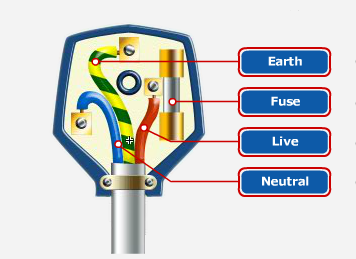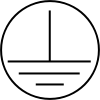Basically, a Portable appliance is given a Class rating by the manufacturer depending on how the user is protected from Electrical Shock.
Electrical appliances classes defined in IEC 61140, and are categorized into one of the five Classes - Class I, Class II, III, 0 or 01.
Electrical appliances classes defined in IEC 61140, and are categorized into one of the five Classes - Class I, Class II, III, 0 or 01.
If an appliance uses mains voltage, it has to provide minimum two levels of protection, many equipments have more, but 2 is the minimum. By having more levels of protection, this ensures the appliance remains safe even if the first level fails.Any portable appliances without a class rating should be treated as a Class 1 appliance.Lets see the different Classes.
Class I Appliances :
The protection inside class 1 appliances combines together the protection of insulation of conductor and a means of connection to the Earth protective conductor (Earth wire).This plastic insulation of the conductor is known as basic insulation. If this basic insulation were to fail, say due to abrasion from excessive movement of the cable where it touches the metal case, then the user could receive an electric shock if the Earth wire is absent.
By connecting to the metal case of the equipment to the Earth wire , the Earth wire keeps all this metal at EARTH Potential.It is impossible to get an electric shock even when the metal case of the fire is connected directly to the LIVE voltage. In practice a fuse would blow either in the plug or the main fuse box to protect the user or a RCD would trip.
Usually Power Cord of Class I appliances is having three core cable with three Pin Plug - One Pin for Live Wire, One for Neutral and another for Earth Wire.

For Class I items, you just need to remember they offer two levels of protection. Remember:
- Basic Insulation
- Earth wire
Symbol :
Examples :
- Toasters,
- Kettles,
- Washing machines,
- Iron Box,
- Water Heater,
- Welding Machines
Class II Appliances:
These appliances are known as double insulated due to the presence of at least two layers of insulation. Often they’re constructed with insulated wiring inside, as well as extra insulation because of the device’s plastic case.The earth connection present in Class II appliances is not required for safety.Hence usually the Power Cord having two core wire - One for Phase and another for Neutral.

For Class II items, you just need to remember they offer two levels of protection. Remember:
- Basic Insulation
- Device Plastic Case
Examples:
- Drillers,
- Angle Grinders
Symbol:
CLASS III
Equipment built to the Class III standard is designed to be supplied from a special safety isolating transformer whose output is known as Separated Extra-Low Voltage or SELV. This must not exceed 50 V AC and is normally below 24V or 12V.There is no use of an Earth in Class III appliances. The electrical safety of Class III appliances is taken care of in the safety isolating transformer design where the separation between the windings is equivalent to double insulation.
Symbol:
The transformer SELV is marked as shown here
Class 0 :
A much rarer form of equipment, these kinds of appliances are generally not found with business and residential environments.Class 0 appliances depend only on basic insulation without a provision for earth. If it fails, it is entirely dependent on the environment around it to remain safe.
Hence it is usually wired with Two Pin Plug without provision for Earth Connection.
Examples:
- A two Pin plug Soldering Iron without provision for earthing.
Class 01 :
Class 01 appliances do have room for an earth connection, in addition to class 0 equipments.
Examples:
- A two Pin plug Brass Lamp with Provision for Earthing at it Case.
Summary:
- If the rating plate has a double box then it is Class II;
- If the rating plate does not have a double box then assume Class I;
- Class II appliances are double insulated and inherently safer than Class I appliances;
- Class I appliances depend on the Earth provided by the installation wiring for their safety.
- Class 0 and 01 are not used for Commercial applications.








